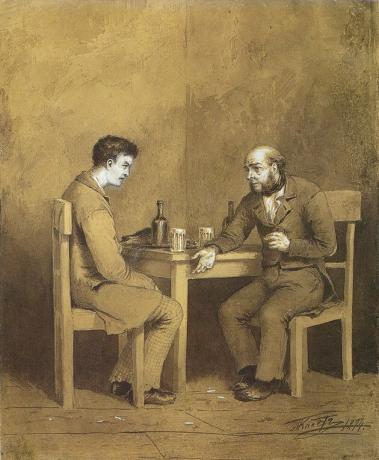Crime and Punishment, by Dostoyevsky: Analysis and Interpretation of the Book
Crime and Punishment is a novel published in 1866. It is the work of the Russian writer and journalist Fyodor Dostoyevsky. It tells the story of a crime committed by former student Rodión Ramanovich Raskolnikov and its consequences.
Crime and Punishment and the psychological test: the criminal mind

One of the most determining characteristics of the novel is the deepening of the psychology of the characters. The internal world is as important as the external one. This dedication to description and internal dialogues makes the novel approach an essay on human psychology.
The main character in the story is Rodion Ramanovich Raskolnikov, a former student who lives in a tiny apartment in Saint Petersburg. He believes that he is destined for great feats but that misery prevents him from reaching his full potential.
A moral question arises: could the murder of a vulgar and despicable person be morally condemned if the objective is superior? Raskolnikov believes that all superior people commit murders to achieve their goals, which represent great advances for humanity.
Convinced that he is one of those people, Raskolnikov believes that killing an old woman (a professional usurer who lends money at very high interest rates and mistreats his younger sister) will allow her to obtain the means to reach his full potential and that, according to his reasoning, this is not morally reprehensible even when it is illegal.
Raskolnikov then sets out to plan the assassination, and one of his biggest concerns is the psychological effect it may have on him in the future. Dostoyevski explores the psychological side in an exceptional way when the former student believes that during and after the murder he could be affected by remorse, which he sees as a disease.
After murdering the woman, Raskolnikov goes into a feverish and delirious state. The story accompanies this state and the reader is involved in innumerable details that go through the murderer's head.
Crime and Punishment and the philosophical essay: is there a crime without punishment?
One of the main questions of the novel is this: even if the criminal believes that the crime is morally justifiable, and even when skilled enough to hide the evidence, will he receive his punishment equally?
The novel then acquires the tone of a philosophical essay on morality and on the relationship of the individual with the society that surrounds him, in this case Russian society, extremely modest, catholic, tsarist and aristocratic.
Despite the fact that Raskolnikov does not feel guilty for the crime committed, society exerts moral pressure on him. The presence of his sister and his mother in Saint Petersburg, after the murder, is a source of extreme disturbance for the central character.
The women in his family are very religious and he loves them very much. The possibility that they know about his crime is a constant concern for Raskolnikov. Dostoyevsky shows that no matter how much morality is something of the individual, it is capable of affecting human relationships even the most intimate circles of coexistence. The possibility of disappointing someone you love is something that is also at stake in decision-making.
Another essential aspect is that Raskolnikov insists that he does not feel guilty for the murder, so he tries to evade punishment until he is already in prison. However, his actions, and his disturbance (which only calms down after confession), seem to indicate otherwise.
Ultimately, it seems that Raskolnikov seeks punishment from the first second after the crime. He does not profit from the stolen goods and falls into a delirious state. When he appears before the judge, his irritability and provocations practically give him away. This makes the reader wonder if Raskolnikov's true desire is to be discovered and suffer punishment.
Crime and Punishment and the social essay: the others
In addition to internal conflicts, many supporting characters help to deepen the questions raised by the character and the author. His family, along with his fellow student Razumikhin and Sonia Marmeladova, constitute a nucleus of support for the protagonist.
As everything in the story is complex, this core assumes various facets and is also responsible for psychologically tormenting the main character in moral terms.
Another kind of nucleus is formed by Porfiry and Zamyotov, responsible for the police investigation. Porfiry confronts Raskolnikov several times, never revealing to him that he is a suspect. Tension envelops the dialogues of the two characters until, finally, Porfiry informally accuses the protagonist.
Two other determining characters are the wealthy suitors of Raskolnikov's sister: Pyotr Petrovich Luzhin and Arkady Ivanovich Svidrigaïlov. Each one, in their own way, tries to subjugate the young woman. These characters come into conflict with the ex-student who, in a way, protects his sister from him.
Even if all the characters relate to Raskolnikov in one way or another, they do not exist just to fulfill a narrative function in the story of the protagonist, but allow, to give greater depth to human relationships and to the novel.
Each character has its own strength, regardless of the central story. Dostoyevsky's grueling physical and moral description of the characters helps to create a universe around them. Most of the dialogues are surprising, the characters act autonomously and do not necessarily correspond to the reader's expectation.
Crime and Punishment: a great fiction
All this makes Dostoyevsky's novel one of the great masterpieces of literary fiction. The philosophical content of the book adds even more value to the story, surprising in itself. The novel is thus a medium for the transmission of great questions.
Dostoyevsky achieved that thanks to great narrative ability. It is through this that the characters interact so vividly and independently, making the story fluid and attractive to the reader. Thus, with a good structure, Crime and Punishment it becomes a novel-essay.
Fyodor Dostoyevsky: realism and existentialism
Fyodor Dostoyevsky's narrative is full of detail in the descriptions of the settings, situations, and characters. This description gives a realistic tone to the author's novels.
Dostoyevsky uses various personal experiences in his novels that help him to make the stories more realistic, which gives his work a semi-autobiographical tone.
See also Existentialism: characteristics, authors and works.
Indeed, the writer was imprisoned in Russia in 1849, after being accused of conspiring against the Tsar. He was exiled to Siberia and later sent to Kazakhstan, where he spent nine years. During this period, he lived with murderers and other types of criminals. His experience in forced labor camps and contact with other prisoners served as the basis for the novel Crime and Punishment.
The internal dialogue and introspections of the characters in Dostoyevsky's work give it an existentialist character. This narrative form, in which the internal life has full action, will be adopted by almost all the great writers of the beginning of the 20th century.
Dostoyevsky was a pioneer in this type of narrative. The play Crime and Punishment is a great example of the use of introspection of the characters for the construction of the plot.
* Translated by Andrea Imaginario.


